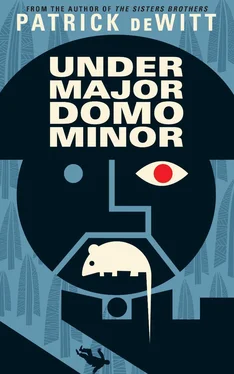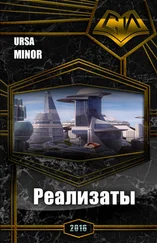“I’m afraid I can’t do that, sir.”
A twinge of panic struck Mr Olderglough. “Haven’t you any money handy at all?
“None.” Lucy paused. “Perhaps, sir, if you were to give me an advance on my wage?”
“Hmm,” said Mr Olderglough. “No, I don’t believe I’ll do that.”
“I was wondering when I might be paid,” Lucy admitted.
“You will be paid on payday, naturally. For now, you will wait in the entryway, please.”
As Lucy travelled from Mr Olderglough’s room to the castle’s entrance, he was struck by the fact of his enjoying the position, enjoying being told what to do, the marvellous simplicity of it. He had always sensed in his mother and father a desire for him to do something, to do anything, but they were remiss in sharing particular instructions and so, being unambitious himself, he accomplished nothing, and only continued to disappoint them. But now, all at once, he was useful, was being used, and this filled him with a sense of dignity. Arriving at the entryway, he stood by the side table awaiting Mr Olderglough and basking in this feeling. Alas, as the minutes passed by, Lucy’s buoyant attitude turned to restlessness, which then evolved to candid boredom. He scanned the shopping list but this offered nothing in the way of entertainment, and so he found himself wishing to steal a glance at the mysterious Baron’s letter. He knew he must not do this, that it was in direct opposition to what Mr Olderglough had told him, but the desire grew and grew further, and soon he gave in to it. Edging a fingernail under the wax seal, he opened the envelope and unfolded the paper.
My Darling,
What news have you? Will you tell me you no longer love me? Whether or not I would prefer this to the damning silence, I won’t say. The truth is that I am no longer steering this devastated ship. I took my hand off the wheel long ago, and have no concerns or thoughts for a destination. May we be dashed over merciful rocks!
Why do the happy times dim in my memory, while the evil ones grow ever more vivid? And furthermore: why do I bother asking you anything anymore? A marvel: how can the days be so full of someone wholly absent? The scope of your void humbles me. It is vast to the point that part of me hopes you have died. This at least would explain your nonappearance, and so would afford me some slight comfort. Also it would make it simpler for me to die. And yet I love you still and more, with every day that floats past.
I am yours alone,
Baron Von Aux
Lucy read this in a rush, and then again, more slowly. It seemed that emanating from the words there was a dim rumble or vibration, and it caused him to bend his ear nearer the page so as to drink it in. He recognized something of himself in the letter; but also he found himself feeling envious of the Baron’s heartsickness, which was surely superior to any he had experienced. This jealousy struck him as childish, and yet he wasn’t in any way ashamed of it. He returned the letter to the envelope and had just set it back on the side table when Mr Olderglough arrived. “You’ll have to make this stretch, boy,” he said, pressing some coins into Lucy’s hand. Calculating their worth, Lucy thought it impossible, and said as much to Mr Olderglough, who in turn espoused the merits of a credit-based society. It was at this point that Agnes came around the corner. Her red fists stabbed and jabbed at the air as she walked, punctuating her evident rage.
“Which of you dumped his porridge in the fireplace!”
“It was Lucy,” said Mr Olderglough, quickly quitting the room. Agnes did not notice his leaving; she moved towards Lucy as if on oiled wheels.
Lucy received his reprimand with what he hoped was something approaching grace. He wiped away the traces of spittle adorning his face and stepped outside, lamenting having lost his hat, as the cold set upon him at once, clinging to his neck, ears, and scalp. He turned up his collar and pushed on; he could hear the train but could not yet see it. Walking towards the tracks, he peered sideward at the village. There was a trickle of smoke seeping from Memel and Klara’s chimney, and Lucy wondered if it was she who had made the fire. He decided she had; and he thought of her crouched before the stove, the flame drawing across the wood. He imagined the smoke spinning in cresting coils before the draft from the flue pulled it taut, encouraging it upwards, and to the open spaces. Lucy felt an aching in his chest. He wanted to know just what Klara’s days looked like.
Arriving at the station, he found Memel and Mewe on the platform, standing toe to toe, engaged in another argument. Memel held a dead hare in his hand, which Mewe lunged for once, twice, three times. Memel yanked it just out of reach; Mewe was fuming. “Hand it over,” he said.
“I will not,” Memel answered.
“But you know that it was in my snare.”
“If it was in your snare you’d be holding the hare, for I would never claim an animal that was not my own.”
“But that’s precisely what you are doing!” Mewe lunged again, and again Memel held the hare at arm’s length. “The most disturbing part of all this,” Mewe said, “is that you’re actually starting to believe your own lies.”
“God Himself only knows what the most disturbing part of it is.”
Mewe wagged a finger. “You always bring God into arguments you know you’re losing, for the liar is lonely, and welcomes all manner of company. Now, I’ll ask you one last time: will you hand over the hare or won’t you?”
“You know that I won’t.”
“Very well.” Mewe brought his boot heel down on Memel’s toe. The old man bellowed, and the hare was flung into the air, with Mewe dashing after. At the same moment he caught the somersaulting thing, Memel tackled him, and now the pair wrestled about in the snow, pulling at the hare and gritting their teeth and damning each other in the most base and common manner. Lucy found this spectacle more than a little intriguing and was curious to see who would emerge hare in hand; but now the train was approaching the station, and so he was forced to turn away.
Stepping to the edge of the platform, he held the letter high in the air. As the train bore down upon him he studied the darkened cockpit for a sign of the engineer; seeing no movement there he grew fearful something had gone amiss, when at the last moment there emerged a meaty hand, fingers splayed, poised to pounce. Lucy held his breath, and as the train hurtled past he was engulfed in a frigid wind, this of such force that he couldn’t tell if the letter had remained in his grip or not. Peering up, he saw that it hadn’t; he spun about to witness the blue envelope flapping in the engineer’s fist. Now the fist was withdrawn. The letter had been posted.
Lucy felt a sense of dizzy satisfaction, an amusement at the strangeness of the event. Being lost to the novelty of this occurrence, he stepped too near the train, so that he felt his body shudder, as though he would be jerked from the platform and into the grinding metal wheels and shrill mechanisms. All at once he understood the train’s unknowable weight and power, and he stepped cautiously backwards as it passed. He didn’t like to think of anyone’s death, least of all his own.
When he turned he saw that Memel and Mewe had ceased their fighting and were standing before him, panting and snow-coated, each of them clinging to opposite ends of the hare. They were smiling. Behind them, at the apex of the looming mountain, Lucy could make out the pops and puffs of the area war, the soldiers scrabbling about, insects swarming cream.
To Memel, he said, “You have taken my pipe again.”
“Yes, that’s true,” said Memel. “Did you want it back?”
Lucy said that he did, and so the pipe was returned to him. He found the mouthpiece was scored with teeth marks, and that the basin smelled of Memel’s rank, inferior tobacco. In a stern tone, he said, “I want you to stop taking it from me, do you understand?”
Читать дальше












